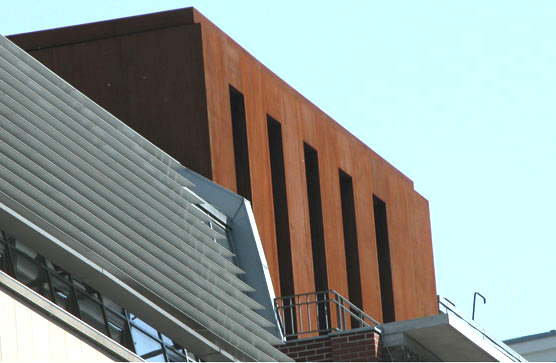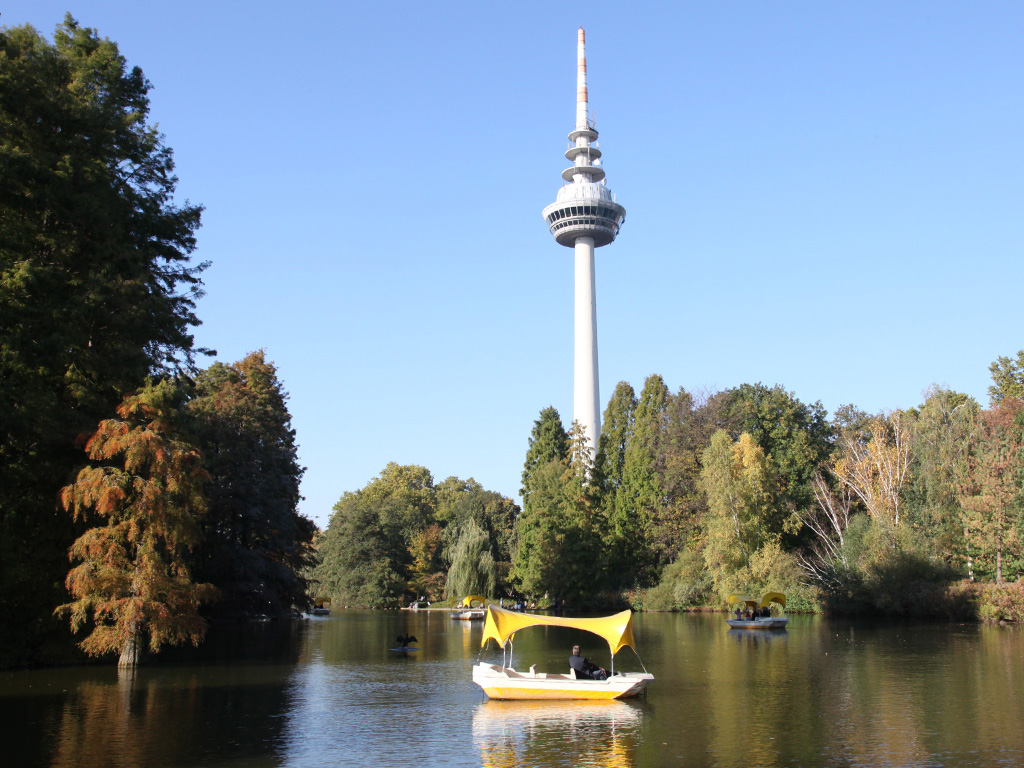|
Klaus Tschira Stiftung
The Klaus Tschira Stiftung (KTS) is a German foundation established by the physicist Klaus Tschira in 1995 as a non-profit organization. Its primary objective is to support projects in the natural and computer sciences as well as mathematics. The KTS places strong emphasis on the public understanding in these fields. Klaus Tschira’s commitment to this objective was honored in 1999 with the "Deutscher Stifterpreis" by the German National Academic Foundation ( German: Studienstiftung). The KTS is located at the Villa Bosch in Heidelberg, Germany, the former residence of Nobel Prize laureate for chemistry Carl Bosch (1874–1940). Activities The foundation mainly initiates academic and non-profit, non-academic research projects in the natural sciences, computer sciences and mathematics. It supports teaching and research at public and private universities as well as projects involving children and young people. Its main goal is to arouse public awareness for natural sciences, to eng ... [...More Info...] [...Related Items...] OR: [Wikipedia] [Google] [Baidu] |
Klaus Tschira
Klaus Tschira (7 December 1940 – 31 March 2015) was a German billionaire entrepreneur and the co-founder of the German software company SAP AG. Life After gaining his Diplom in physics and working at IBM, Tschira co-founded the German software giant SAP AG in 1972 in Mannheim, Germany together with Hans-Werner Hector, Dietmar Hopp, Hasso Plattner and Claus Wellenreuther. From 1998 to 2007, he was a board member at SAP. He was married to Gerda Tschira and had two sons, Harald and Udo. He died on 31 March 2015 in Heidelberg. Klaus Tschira Foundation The Klaus Tschira Foundation (KTF) was established by Tschira in 1995 as a non-profit organization. Its primary objective is to support projects in natural and computer sciences as well as mathematics. The KTF places strong emphasis on public understanding in these fields. Tschira's commitment to this objective was honored in 1999 with the "Deutscher Stifterpreis" by the German National Academic Foundation (German: Studienst ... [...More Info...] [...Related Items...] OR: [Wikipedia] [Google] [Baidu] |
Studienstiftung
The German Academic Scholarship Foundation (German: , or ''Studienstiftung'' for short) is Germany's largest and most prestigious scholarship foundation. According to its statutes, it supports "the university education of young people who, on account of their exceptional academic or artistic talents and their personalities, can be expected to make an outstanding contribution to society as a whole". The ''Studienstiftung'' is non-political, non-denominational and ideologically independent. Its headquarters are located in Bonn; it also has an office in Berlin. The current president is University of Bonn director , and its patron (') is the President of Germany, Frank-Walter Steinmeier. The ''Studienstiftung,'' like 12 other scholarship foundations (), is funded by the German Federal Ministry of Education and Research, with funds from the federal government, the German federal states and local authorities, numerous foundations and businesses as well as numerous private donors. In 20 ... [...More Info...] [...Related Items...] OR: [Wikipedia] [Google] [Baidu] |
Carl Bosch
Carl Bosch (; 27 August 1874 – 26 April 1940) was a German chemist and engineer and Nobel Laureate in Chemistry. He was a pioneer in the field of high-pressure industrial chemistry and founder of IG Farben, at one point the world's largest chemical company. Biography Early years Carl Bosch was born in Cologne to a successful gas and plumbing supplier. His father was Carl Friedrich Alexander Bosch (1843–1904) and his uncle was Robert Bosch, who pioneered the development of the spark plug and founded the multinational company Bosch. Carl, trying to decide between a career in metallurgy or chemistry, studied at the ''Königlich Technische Hochschule Charlottenburg'' (now the Technical University of Berlin) and the University of Leipzig from 1892 to 1898. Career Carl Bosch attended the University of Leipzig, and this is where he studied under Johannes Wislicenus, and he obtained his doctorate in 1898 for research in organic chemistry. After he left in 1899 he t ... [...More Info...] [...Related Items...] OR: [Wikipedia] [Google] [Baidu] |
Heidelberg Laureate Forum
Heidelberg (; Palatine German: '''') is a city in the German state of Baden-Württemberg, situated on the river Neckar in south-west Germany. As of the 2016 census, its population was 159,914, of which roughly a quarter consisted of students. Located about south of Frankfurt, Heidelberg is the fifth-largest city in Baden-Württemberg. Heidelberg is part of the densely populated Rhine-Neckar Metropolitan Region. Heidelberg University, founded in 1386, is Germany's oldest and one of Europe's most reputable universities. Heidelberg is a scientific hub in Germany and home to several internationally renowned research facilities adjacent to its university, including the European Molecular Biology Laboratory and four Max Planck Institutes. The city has also been a hub for the arts, especially literature, throughout the centuries, and it was designated a "City of Literature" by the UNESCO Creative Cities Network. Heidelberg was a seat of government of the former Electorate of the ... [...More Info...] [...Related Items...] OR: [Wikipedia] [Google] [Baidu] |
Luisenpark
The Luisenpark is a municipal park in Mannheim, Baden-Württemberg, Germany. It is located on the left bank of the Neckar river and has an area of 41 hectares. The lower Luisenpark (''Unterer Luisenpark'') is the oldest part which is conserved as a historic garden. The upper Luisenpark (''Oberer Luisenpark'') includes various attractions, such as a greenhouse, an arboretum, a Chinese garden, "gondoletta" boats, and a variety of facilities for children. Along with the Herzogenriedpark (33 hectares; located on the other side of Neckar) the upper Luisenpark is operated by the non-profit Stadtpark Mannheim GmbH. History The Luisenpark was built between 1892 and 1903, formed upon the legacy of scientist Carl William Casimir Fox, who bequeathed 20,000 Deutsche Marks in his will to the city of Mannheim for the making of a new park. This amount was not sufficient for total financing, but formed a foundational start. Construction work began at the end of 1892. The design of the park wa ... [...More Info...] [...Related Items...] OR: [Wikipedia] [Google] [Baidu] |
Heidelberg Institute For Theoretical Studies
The Heidelberg Institute for Theoretical Studies (HITS gGmbH) was established in 2010 by SAP co-founder Klaus Tschira through his foundation, the "Klaus Tschira Stiftung", as a private, non-profit research institute. HITS conducts basic research involving the processing structuring and analysis of large amounts of data in the natural sciences, mathematics and computer science. The research topics range from molecular biology to astrophysics. Shareholders of HITS are theHITS-Stiftung, Heidelberg University and the Karlsruhe Institute of Technology (KIT). HITS cooperates with universities and research institutes, as well as with industrial partners. The prime external funding sources are the Federal Ministry of Education and Research, the German Research Foundation and the European Union. Research groups At the moment, HITS comprises following research groups: ;Astroinformatics (AIN) The Astroinformatics group develops new approaches to analyze and process the increasing amount o ... [...More Info...] [...Related Items...] OR: [Wikipedia] [Google] [Baidu] |
Reiss Engelhorn Museum
The Reiss Engelhorn Museum, or (rem for short), is a museum in Mannheim, Germany. It has an exhibition area of , and houses around 1.2 million objects. Facilities and collection The Reiss-Engelhorn-Museum is one of the major museums in Mannheim and comprises four exhibition halls presenting exhibits in archaeology, world cultures, history of art and culture, photography and history of theater and music. The main facility is the Zeughaus Museum, which features exhibit areas for art, decorative art and cultural history, theater, literature and antiquities. The International Photography Forum, located on the fourth floor, displays photographs from the permanent collections ranging from 19th century to contemporary works and presents exhibitions. The World Cultures Museum features displays of archaeology from the Metal Ages up through the Roman era, as well as medieval Germany, and ancient Egyptian art and culture. The Bassermannhaus Museum of Music and Fine Arts features a large ... [...More Info...] [...Related Items...] OR: [Wikipedia] [Google] [Baidu] |
Radiocarbon Dating
Radiocarbon dating (also referred to as carbon dating or carbon-14 dating) is a method for determining the age of an object containing organic material by using the properties of radiocarbon, a radioactive isotope of carbon. The method was developed in the late 1940s at the University of Chicago by Willard Libby. It is based on the fact that radiocarbon () is constantly being created in the Earth's atmosphere by the interaction of cosmic rays with atmospheric nitrogen. The resulting combines with atmospheric oxygen to form radioactive carbon dioxide, which is incorporated into plants by photosynthesis; animals then acquire by eating the plants. When the animal or plant dies, it stops exchanging carbon with its environment, and thereafter the amount of it contains begins to decrease as the undergoes radioactive decay. Measuring the amount of in a sample from a dead plant or animal, such as a piece of wood or a fragment of bone, provides information that can be used to calc ... [...More Info...] [...Related Items...] OR: [Wikipedia] [Google] [Baidu] |
University Of Karlsruhe
The Karlsruhe Institute of Technology (KIT; german: Karlsruher Institut für Technologie) is a public research university in Karlsruhe, Germany. The institute is a national research center of the Helmholtz Association. KIT was created in 2009 when the University of Karlsruhe (), founded in 1825 as a public research university and also known as the "Fridericiana", merged with the Karlsruhe Research Center (), which had originally been established in 1956 as a national nuclear research center (, or KfK). KIT is a member of the TU9, an incorporated society of the largest and most notable German institutes of technology.TU9 As part of the German Universities Excellence Initiative KIT was one of three universities which were awarded excellence status in 2006. In the following "German Excellence Strategy" KIT was awarded as one of eleven "Excellence Universities" in 2019. KIT is among the leading technical universities in Germany and Europe. According to different bibliometric ranking ... [...More Info...] [...Related Items...] OR: [Wikipedia] [Google] [Baidu] |
Karlsruhe Institute Of Technology
The Karlsruhe Institute of Technology (KIT; german: Karlsruher Institut für Technologie) is a public research university in Karlsruhe, Germany. The institute is a national research center of the Helmholtz Association. KIT was created in 2009 when the University of Karlsruhe (), founded in 1825 as a public research university and also known as the "Fridericiana", merged with the Karlsruhe Research Center (), which had originally been established in 1956 as a national nuclear research center (, or KfK). KIT is a member of the TU9, an incorporated society of the largest and most notable German institutes of technology.TU9 As part of the German Universities Excellence Initiative KIT was one of three universities which were awarded excellence status in 2006. In the following "German Excellence Strategy" KIT was awarded as one of eleven "Excellence Universities" in 2019. KIT is among the leading technical universities in Germany and Europe. According to different bibliometric ranking ... [...More Info...] [...Related Items...] OR: [Wikipedia] [Google] [Baidu] |
Foundations Based In Germany
Foundation may refer to: * Foundation (nonprofit), a type of charitable organization ** Foundation (United States law), a type of charitable organization in the U.S. ** Private foundation, a charitable organization that, while serving a good cause, might not qualify as a public charity by government standards * Foundation (cosmetics), a multi-coloured makeup applied to the face * Foundation (evidence), a legal term * Foundation (engineering), the element of a structure which connects it to the ground, and transfers loads from the structure to the ground Arts, entertainment, and media Film and TV * ''The Foundation'', a film about 1960s-1970s Aboriginal history in Sydney, featuring Gary Foley * ''Foundation'' (TV series), an Apple TV+ series adapted from Isaac Asimov's novels * "The Foundation" (''Seinfeld''), an episode * ''The Foundation'' (1984 TV series), a Hong Kong series * ''The Foundation'' (Canadian TV series), a 2009–2010 Canadian sitcom Games * ''Foundation ... [...More Info...] [...Related Items...] OR: [Wikipedia] [Google] [Baidu] |



.jpg)

